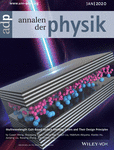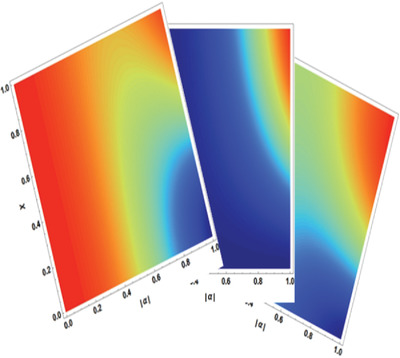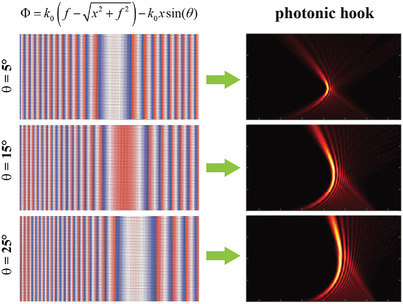Journal list menu
Export Citations
Download PDFs
Cover Picture
Surface-Emitting Lasers: Multiwavelength GaN-Based Surface-Emitting Lasers and Their Design Principles (Ann. Phys. 1/2020)
- First Published: 08 January 2020
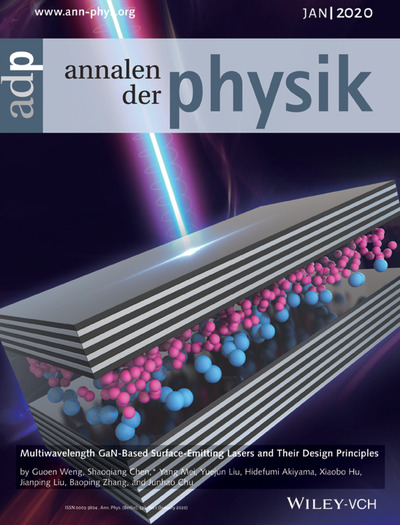
In article number 1900308, Shaoqiang Chen and co-workers propose a controllable multiwavelength GaN-based vertical-cavity surface-emitting laser using asymmetric quantum well or multistacked size-varied quantum dot active regions. The components and intensity of the multi-laser outputs are demonstrated to be continuously adjustable. The analysis reveals that the electron–photon interaction, carrier tunneling, and photon reabsorption play a crucial role in the multiwavelength lasing processes. The design principles of the proposed active regions are also elaborated upon to provide guidelines for high performance multiwavelength emissions in GaN-based surface-emitting lasers.
Back Cover
MXene Nanosheets: Harmonic Mode-Locked Er-Doped Fiber Laser by Evanescent Field-Based MXene Ti3C2Tx (T = F, O, or OH) Saturable Absorber (Ann. Phys. 1/2020)
- First Published: 08 January 2020

MXenes, as a legendary family of two-dimensional (2D) van der Waals nanosheets materials, have been extensively studied due to their unique characteristics of broadband nonlinear optical response. In article number 1900437, Xiaohui Li, Han Zhang, and co-workers characterize MXene nanosheets systemically, and successfully apply MXene nanosheets in an Er-doped fiber laser to achieve harmonic mode-locking with a repetition frequency of 218.4 MHz.
Masthead
Editorial
Original Papers
Multiwavelength GaN-Based Surface-Emitting Lasers and Their Design Principles
- First Published: 14 November 2019
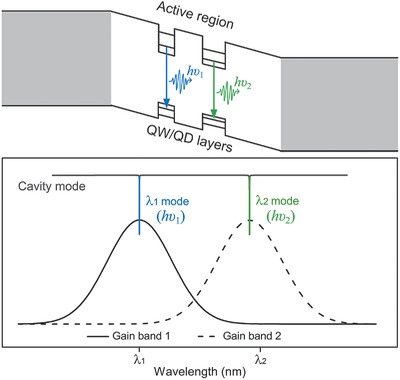
Controllable multi-wavelength GaN-based vertical-cavity surface-emitting lasers are proposed by using asymmetric quantum wells or multistacked size-varied quantum dots active regions. The components and intensity of the multi-laser outputs are demonstrated to be continuously adjustable. The analysis reveals that the electron–photon interaction, carrier tunneling, and photon reabsorption play a crucial role in the multiwavelength lasing processes.
Manipulating Nonclassicality via Quantum State Engineering Processes: Vacuum Filtration and Single Photon Addition
- First Published: 20 November 2019
Detecting Non-Markovianity via Linear Entropy of Choi State
- First Published: 29 November 2019
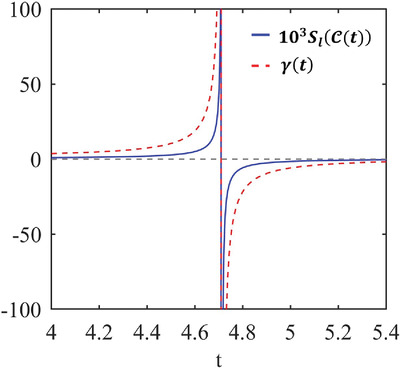
A new method to detect non-Markovianity by the linear entropy is proposed. The positive definiteness of the Choi state is broken in non-Markovian dynamical evolutions, which can be witnessed by its linear entropy. Thus, linear entropy can be used to witness the non-Markovianity. Also, the linear-entropy-based non-Markovianity witness scheme is extended to the one based on Rényi entropy.
Ferromagnetic Phase in Graphene-Based Planar Heterostructures Induced by Charged Impurity
- First Published: 01 December 2019
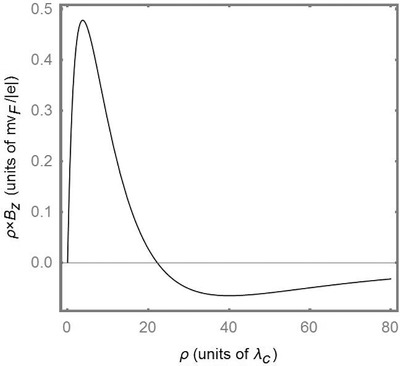
Spontaneous generation of ferromagnetic phase in a planar electron–positron system similar to graphene and related heterostructures doped by an impurity with charge Z is shown to be possible beyond a peculiar analogue of the Curie point in ferromagnetics . The properties of induced ferromagnetic state are studied in detail.
All-Optical Spin–Orbit Coupling of Light in Coherent Media Using Rotating Image
- First Published: 04 December 2019
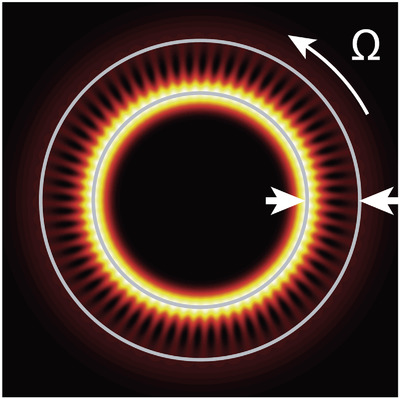
A rotating-image scheme is proposed to realize all-optical spin–orbit coupling of light in coherent media. Such a scheme supplies a practical solution to achieve highly tunable and even visible SOC splitting of light, and paves a convenient pathway for direct visualization of a quantum system with relativistic corrections in experiments based on quantum-optical analogy.
Remote Implementation of a Fredkin Gate via Virtual Excitation of an Atom-Cavity-Fiber System
- First Published: 01 December 2019

A novel scheme for implementing a Fredkin gate is proposed by controlling the nonlocal state-swap of two spatially separated target atoms according to the state of the control atom at hand. In the scheme, only the control atom at hand needs the laser to drive and the virtual excitation of an atom-cavity-fiber system effectively suppresses the decoherence.
Protecting Quantum Fisher Information in Correlated Quantum Channels
- First Published: 01 December 2019
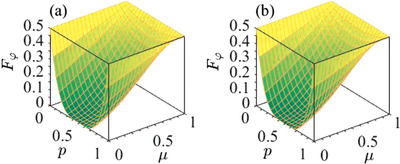
The control of quantum Fisher information (QFI) in correlated quantum channels is explored. It is shown that while the decoherence effect is detrimental to QFI, the classical correlations between consecutive actions of the quantum channel can be harnessed to improve QFI in a wide regime of the quantum channel, and such an improvement applies to very general probe states.
Efficient Ultraviolet Nanosources Based on Third-Harmonic Generation in Dielectric–Metal Composite Nanodisks
- First Published: 01 December 2019
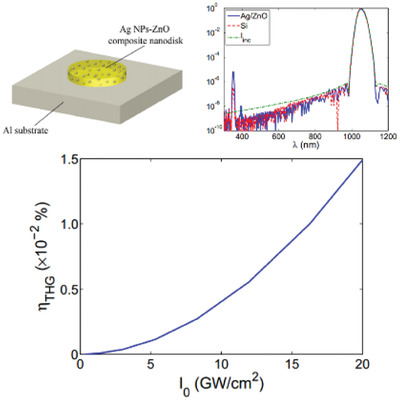
Dielectric-metal nanocomposites are proposed as alternative high-index materials for dielectric nanophotonics. They have much lower losses in the range from blue to near ultraviolet (UV) compared with commonly used high-index dielectrics, enabling highly efficient UV generation. ZnO nanodisk containing silver nanoparticles generates third-harmonic radiation at 351.3 nm with an efficiency about 20 times higher than the case of silicon nanodisk.
1D Solitons in Saturable Nonlinear Media with Space Fractional Derivatives
- First Published: 04 December 2019
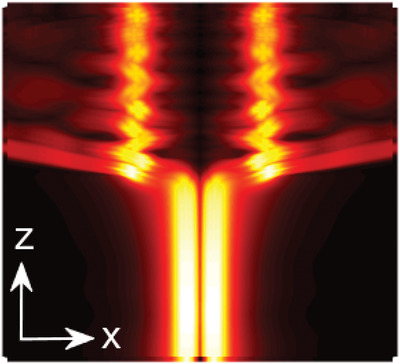
Herein, light propagation in saturable cubic or quintic nonlinear media with space fractional derivatives is studied numerically and theoretically, described by the nonlinear fractional Schrödinger equation with nonlinear lattices. Using the linear-stability analysis and direct simulations, 1D soliton families including fundamental solitons (single peak) and higher-order solitonic structures consisting of two hump solitons (in-phase) and dipole ones are predicted.
Tunable Optical Hooks in the Visible Band Based on Ultra-Thin Metalenses
- First Published: 01 December 2019
Harmonic Mode-Locked Er-Doped Fiber Laser by Evanescent Field-Based MXene Ti3C2Tx (T = F, O, or OH) Saturable Absorber
- First Published: 01 December 2019
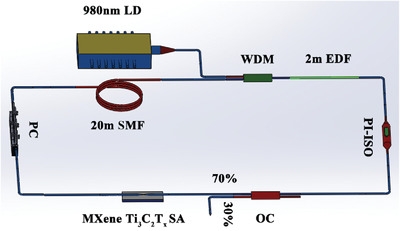
MXenes, as a legendary family of 2D van der Waals nanosheets materials, are extensively studied due to their unique nonlinear optical characteristics. MXene Ti3C2Tx SA is incorporated into an Er-doped fiber laser to achieve 36th harmonic mode-locking with the pulse width of 850 fs, corresponding to the repetition frequency of 218.4 MHz.
Combining Complex and Radial Slave Boson Fields within the Kotliar–Ruckenstein Representation of Correlated Impurities
- First Published: 04 December 2019
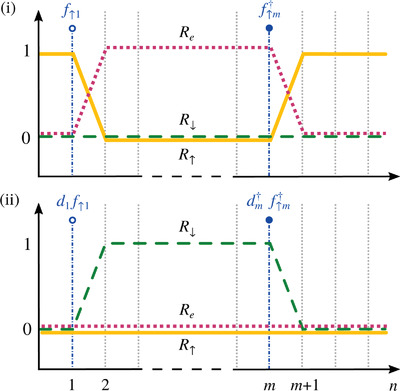
The procedure to carry out with no approximation involved the functional integrals representing the partition function and the Green's functions of the Hubbard model within its Kotliar–Ruckenstein representations in radial gauge is presented herein. This integration takes advantage of the gauge symmetry of the representation and involves constrained fermionic fields, complex bosonic fields, and radial bosonic fields.




